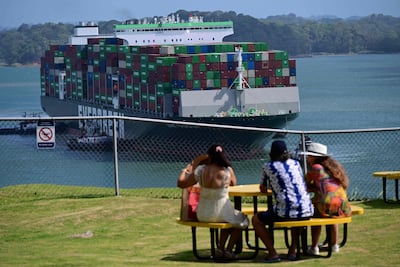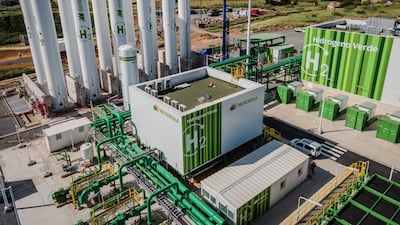Hydrogen could be the UAE's “fifth wave” of cleaner energy as the Middle East and North Africa emerge as key players in trade of the “future fuel”, a summit has heard.
The UAE and Netherlands were leading talks on Monday on how to massively scale up trade in the infant hydrogen industry.
Hydrogen is tipped to replace fossil fuels in sectors such as aviation, shipping and heavy industry but is little used today, partly because it is expensive.
However, sector bosses at a hydrogen summit in Rotterdam, the Netherlands, were told cross-border trade could wipe $3.7 trillion off costs by 2050.
Solar power-rich countries are in line to benefit, with Morocco on Monday positioning itself as a key seller to Europe using new and existing pipelines.
Abu Dhabi clean energy company Masdar told the summit it is “fully committed” to the growth of the hydrogen industry.
Florian Merz, a Masdar associate director of business development, described green hydrogen as the “fifth wave of the energy transition”.
“We started 50 years ago with LNG, then went to gas import by pipeline, then to renewables about 15 years ago, to nuclear, and now to green hydrogen,” he said.
Morocco mission
A 20-country hydrogen trade group co-chaired by the Netherlands and the UAE held talks in Rotterdam on Monday.
Morocco recently joined the club and is urging potential customers in Europe to put economic muscle such as subsidies behind the trade route.
It touts the fact they are already connected by the Maghreb-Europe gas pipeline and a power cable link to Spain.
“There can be multiple corridors being developed – at least on PowerPoint slides,” said Leila Benali, Morocco’s Minister for Energy Transition and Sustainable Development.
“But the ones that are actually realistic are the ones where we have existing connectivity today,” she told the World Hydrogen Summit.

There is interest from Europe in a “southern corridor” connecting North Africa to Italy, Germany and Austria.
Austria, a second new member of the UAE and Dutch-led club, is keen as a landlocked country to identify trade routes.
“We will need imports from trusted partners and so imports of green hydrogen play a crucial role in our way to net zero,” said Austria’s Minister for Climate Action, Leonore Gewessler.
“We are working a lot on the southern hydrogen corridor to import from North Africa to Italy, Germany and Austria.”
Although abundant in nature, hydrogen normally has to be split off from compounds such as water to be used as fuel.
Only if this is done in a climate-friendly way rather than using fossil fuels does it count as “green hydrogen”.
The green type made up only 0.7 per cent of total hydrogen demand in 2022, according to the International Energy Agency. It says a 100-fold increase would be needed by 2030 to put things on track for net-zero deadlines.

Morocco’s ability to produce clean solar power is “not the issue” but Europe needs to firm up its plans to bring in the necessary investment, Ms Benali said.
She urged countries to see the “additional value” of green hydrogen as a tool to fight climate change and reshape energy politics.
“We are not asking for binding contracts today, but at least some visibility on how we are scaling the green hydrogen economy,” she said.
Partnership promise
European officials are stressing that they want partners in North Africa and beyond to benefit from the hydrogen trade.
Analysis for the Hydrogen Council, a group of companies, suggests a potential $3.7 trillion saving if hydrogen is traded across borders.
“We want to prevent that everyone is reinventing the solutions,” said Dutch Deputy Prime Minister Rob Jetten, who oversees climate and energy policy.
He said the talks in the UAE and Dutch-led forum had a “positive vibe” and “you can really feel the buzz”.
“A country like Morocco, but several other countries, are in potential an energy powerhouse to provide the rest of the world with green renewables and green hydrogen,” he said.
“But these are also countries that are still also trying to modernise their own economy, make sure there is cheap and affordable and renewable energy for their own local population.
“If we want to do this right … we have to connect it to the sustainable development goals and we have to connect this to making sure that we provide also for the local communities in the potential exporting countries.”


